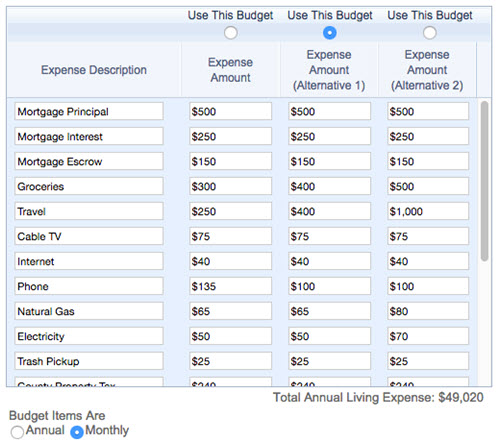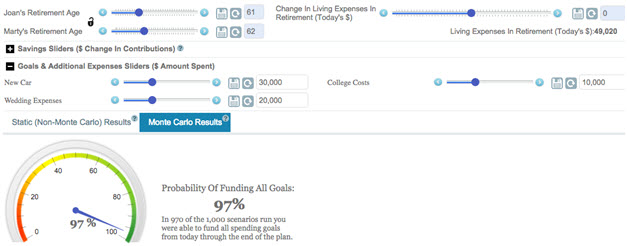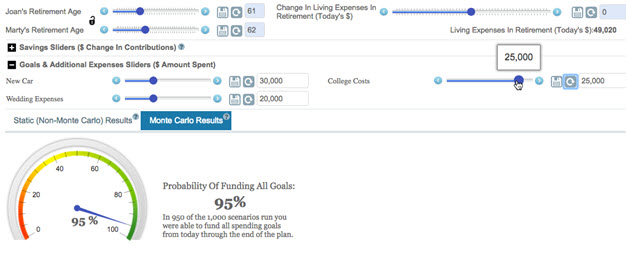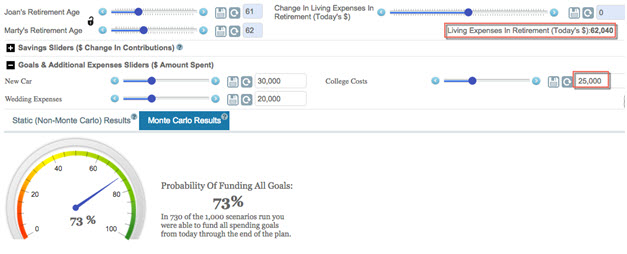Key Points:
- Having a good idea of what you'll spend in retirement is just as important as knowing how much you need to save and invest before retirement.
- Tracking spending before retirement--even if you don't really need to budget--is a good way to get a handle on what your spending might look like during retirement.
- Non-recurring items, such as college expenses for children or larger purchases, need to be accounted for as well.
In planning for retirement, a lot of time and effort and focus is understandably on saving enough money and investing it in the right securities. But a successful retirement plan--especially one that is longer than normal--can depend at least as much on spending.
Having a general awareness about spending is a good idea for a number of reasons. It can lead to a positive change in habits, for one thing. ("I had no idea I was spending that much on lunch takeout," or, "We could save a third or more on gasoline with a more efficient car.") Having that awareness also practically forces one to start thinking about what expenses will continue on into one's retirement years.
In other words, one of the best reasons to track spending before retirement is to get an idea of what spending might be like during retirement. A lot of families never get around to tracking spending or doing a budget because they are paying the bills and saving money like they should be, so they simply don't feel the need. Outside of the mortgage and the car payments, a lot of people really don't know where the money goes on a day-to-day basis.
Now And Later
In retirement, some expenses will go up, and some will go down; some will disappear entirely, and new ones will pop up. But if you at least have a loose grip on what spending looks like now, you'll be better equipped to come up with that all-important number asked by planners and retirement planning software programs: What do you plan to spend in retirement?
Let's have a look at an example. This is a couple around 50 years old, hoping to retire in their early 60s. Their save-and-invest years are now largely (though not entirely) behind them; in running the numbers through WeathTrace, they are finding that changes in rates of spending in retirement can have a dramatic impact on the probability of their retirement plan's success.
The trouble is, they don't have a good sense of what their retirement spending will look like--because they don't know what their spending looks like now. So their first step is to track their current spending.
This need not be an entirely precise budget to be followed to the penny. It just needs to give the couple an idea of where the money is going. There are automated web-based ways of tracking this spending, such as via Mint, but a good old fashioned paper-and-pen approach works just as well for this purpose.
Once they have that information, here's what their budget worksheet might look like:

WealthTrace allows you to have three variations on a budget, and to toggle among them to see what the effect would be on a plan.
Tracking And Projecting
This is largely straightforward stuff: Take today's expenses, maybe bump them up a bit to be conservative and account for rate increases on fixed expenses (though WealthTrace will handle the effects of inflation for you), and tally it up.
For potential retirees, the wildcards are often travel or health care. The cost of these things cannot usually be predicted with a high degree of certainty, and could vary considerably from year to year.
There are likely also other non-recurring (or at least not annually recurring) expenses or goals that don't fit so well into a budget worksheet. These might include new car purchases or tuition costs for a child or grandchild. Although not regular expenses, they can be large, and definitely need to be accounted for when estimating spending.

WealthTrace can handle expenses and goals that occur at nonstandard intervals.
Once you have put all of this information together, you can start to see what effect changes to your spending assumptions will have on your plan.
Here's what our couple's base case looks like run through WealthTrace's Monte Carlo simulator:

Things are looking pretty good. Note that the $49,020 "Living Expenses In Retirement" figure comes from our original budget worksheet, and that the "Goals & Additional Expenses" figures flow in from the additional goals we added to the program.
A 97% probability of funding all goals is a nice place to be. In fact, it might indicate that our couple could increase their spending a bit. For example, that $10,000 a year they have budgeted for college costs probably won't get a future student all that far. What happens if we increase that to $25,000 per year? Let's take a look:

The plan is still looking good, with a 95% probability of success. Those college costs only occur for four years, after all. Remember our budget options from the first part of this article? What happens if we go to the deluxe model--the one with the big jump in travel spending--and leave our couple's contribution to college costs at $25,000?

Even after increasing day-to-day spending by more than 25% and ramping up the college cost contribution, a 73% probability of funding all goals is something most couples should be able to work with. A few tweaks could easily get it to over 80%.
Data Entry With A Purpose
Getting a handle on spending is somewhat tricky and time consuming, at least for a while. But it is every bit as important as socking away your money and investing it wisely. Don’t do one without doing the other.
Small changes to savings and spending can have a big effect on a plan. WealthTrace shows you how big. Sign up for a free trial of WealthTrace to find out more.